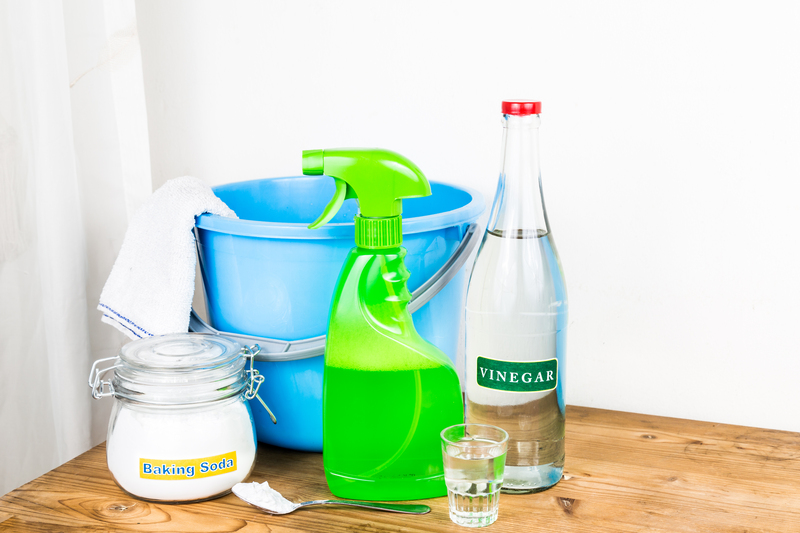Say Goodbye to Pet Odor in Your Living Quarters
Posted on 25/08/2025
Say Goodbye to Pet Odor in Your Living Quarters
Are you tired of persistent pet smells taking over your home? Even the cleanest of pet enthusiasts sometimes struggle with unpleasant odors that cling to everything. If you're ready to reclaim fresh living spaces and finally say goodbye to pet odor in your living quarters, you're in the right place!
Why Does Pet Odor Linger in Your Home?
Understanding why pet odors linger is the first step toward preventing and eliminating them. Pets like dogs, cats, birds, rabbits, and rodents shed fur, dander, and natural oils on a daily basis. In addition, accidents such as urine or vomit on carpets and upholstery can embed strong odors deep within fibers.
- Pet Dander: Tiny particles of skin, similar to human dandruff, often settle on furniture and floors.
- Saliva & Sweat: Dogs and cats have sweat glands in their feet and mouths; their saliva can leave stubborn smells.
- Litter Boxes & Cages: Without regular cleaning, these become breeding grounds for odor-causing bacteria.
- Accidents: Occasional urine or feces incidents can be especially tough to eradicate, particularly from carpets and rugs.

Winning the Battle: Strategies to Remove Pet Odor
Banishing pet odors from your home is all about consistency, the right techniques, and choosing products that are effective yet safe for both pets and humans.
Routine Cleaning: The First Line of Defense
- Vacuum Frequently: Using a vacuum with a HEPA filter picks up fur, dander, and microscopic odor particles. Aim to vacuum carpets, area rugs, and upholstery at least three times a week if you have shedding pets.
- Wash Pet Bedding: Just like your sheets, your pet's bed should be washed weekly in hot water. Choose bedding with removable, machine-washable covers for easy cleaning.
- Launder Soft Furnishings: Curtains, couch throws, and pillow covers can all harbor pet odor. Wash these items regularly, following care instructions.
- Scrub Hard Floors: Don't forget laminate, tile, or hardwood. Mop with a pet-safe cleaner weekly to prevent buildup of grime and pet oils.
Targeting Tough Spots: Carpets and Upholstery
Carpet and fabric furniture often trap the most potent pet smells. Here's how to deal with them effectively:
- Enzymatic Cleaners: These powerful products use natural enzymes to break down the proteins found in urine, vomit, and feces--which are primary causes of stubborn pet odor in your living quarters. Be sure to saturate the affected area, let the cleaner sit, then blot--a critical step for total odor neutralization.
- Baking Soda Solutions: Baking soda is renowned for its deodorizing abilities. Sprinkle it on carpets or furniture, leave it overnight, then vacuum thoroughly.
- Steam Cleaning: Consider renting or buying a steam cleaner for deep cleaning carpets and couches. Steam not only lifts dirt but also kills odor-causing bacteria.
Banishing Odors from Hard-to-Clean Places
- Air Vents & Filters: Pet dander can circulate throughout your HVAC system. Change filters regularly and consider having ducts professionally cleaned.
- Walls & Baseboards: Wipe them with a diluted vinegar solution. Vinegar is a fantastic natural deodorizer and helps eliminate persistent smells that accumulate over time.
Refreshing the Air: Natural & Safe Deodorizers
Sometimes, it's not enough to remove the source--sometimes you need to neutralize lingering pet odor in your living quarters by treating the air itself.
- Activated Charcoal: These porous black bags or canisters are superb for absorbing odors and toxins from the air, and they're completely safe for pets.
- Baking Soda Bowls: Place small bowls of baking soda throughout your home where odors are strongest. Baking soda traps and neutralizes bad smells.
- Essential Oil Diffusers: Diffuse only pet-safe essential oils like lavender or chamomile. Never use oils that are toxic to pets, such as tea tree or citrus oils, especially in small spaces.
- Houseplants: Plants such as spider plant, Boston fern, or bamboo palm are known for their air-purifying qualities. They can also add greenery and freshness to your home.
Maintaining Litter Boxes and Pet Zones
- Scoop Daily: Remove waste from litter boxes and cages each day.
- Change Litter Often: Replace litter and wash the box or cage at least weekly to combat ammonia smells from urine.
- Sprinkle Deodorizing Powder: There are commercial and DIY pet-safe powder deodorizers for litter and bedding areas.
Preventing Pet Odor: Create a Long-Term Freshness Plan
Pet Grooming and Hygiene
Keeping your pet clean is crucial to controlling odor at the source.
- Regular Baths: Bathe your dog every 4-6 weeks (unless otherwise recommended by your vet). Cats generally do not need regular baths unless they get dirty or have medical conditions.
- Routine Brushing: Daily or weekly brushing controls loose fur and spreads natural oils, reducing shedding and the buildup of dander around your home.
- Oral Care: Don't neglect your pet's teeth--bad breath can become pervasive, especially for indoor pets.
- Paw & Ear Wipes: Use pet-safe wipes to clean paws and ears as these areas often attract dirt, bacteria, and odor.
Train Your Pet to Minimize Accidents
Consistent training is key to reducing indoor accidents that contribute to pet odor in homes.
- Set a Regular Potty Schedule: Take dogs outside frequently and proactively encourage puppies and older pets to follow a strict routine.
- Reward Good Behavior: Use treats and praise for successful potty habits; positive reinforcement works wonders.
- Attend to Accidents Immediately: The quicker you address a mess, the less likely the odor will become a long-term problem.
DIY Pet Odor Removal Remedies
Sometimes commercial products aren't available, or you may prefer natural approaches. These handy DIY solutions can tackle pet odor quickly and inexpensively.
Quick Natural Deodorizers
- White Vinegar & Water: Mix equal parts for a powerful, eco-friendly cleaner that neutralizes odors on floors, furniture, and even pet toys.
- Lemon Juice: The natural acids in lemon are great for banishing minor smells but use sparingly and test on surfaces first.
- Hydrogen Peroxide: Safe in diluted form, hydrogen peroxide can neutralize strong odors, especially from pet urine (always spot test first).
- Sunlight: Place pet bedding or affected items outside in the sun; sunlight helps break down odor molecules and bacteria.
Professional Solutions for Stubborn Pet Smells
When to Call in the Experts
Sometimes, persistent pet odor in your living quarters can resist all your best efforts, especially after repeated accidents or with multiple pets in the household. If so, consider:
- Professional Carpet & Upholstery Cleaners: These teams have industrial machines and specialty enzymatic chemicals for deep cleaning that household units can't match.
- Duct Cleaning Companies: If you've tried everything and still notice pet odors, the culprit may be inside your home's heating and air system.
- Ozone Generators: Used by professionals, these units blast ozone to oxidize and break apart tough odor molecules. Your home must be vacant during this process for safety.
Choosing Pet-Safe Cleaning Products
- Read Labels: Avoid cleaners containing ammonia (which smells like urine to pets), bleach, or artificial fragrances that can irritate animals' lungs and skin.
- Opt for Enzyme-Based: Products labeled "pet-safe" or "biodegradable" are generally formulated to be gentle on sensitive noses and paws.

Frequently Asked Questions About Pet Odor in the House
What is the fastest way to remove pet odor from carpets?
Act fast: Blot up accidents right away, spray the affected spot with an enzymatic cleaner, and sprinkle with baking soda. Let it sit, then vacuum. Repeat as needed for total freshness!
Can pet odor affect indoor air quality?
Yes! Pet odor doesn't just linger in fabrics--it can circulate throughout your entire living quarters. Good ventilation and regular cleaning are essential to keep the air you and your pets breathe clean and fresh.
How often should I deep clean my home to keep pet odors away?
Ideally, perform a thorough deep cleaning every 2-3 months. In between, maintain a weekly schedule for laundry, vacuuming, and wiping down surfaces.
Are air fresheners safe and effective at masking pet odor?
Most air fresheners offer only temporary results and may contain chemicals that irritate pets. Rely on natural deodorizers and regular cleaning to truly eliminate pet odor in your living quarters.
Conclusion: Embrace a Fresher, Happier Home
Living with pets doesn't mean you have to tolerate unpleasant odors. By adopting these comprehensive, proactive strategies, you can say goodbye to pet odor in your living quarters once and for all. From routine cleaning to natural DIY remedies--and knowing when to call in professionals--you'll discover a fresh, welcoming home that's a joy for pets and humans alike. Start implementing these solutions today and enjoy the clean, comforting sanctuary you and your furry friends deserve!




